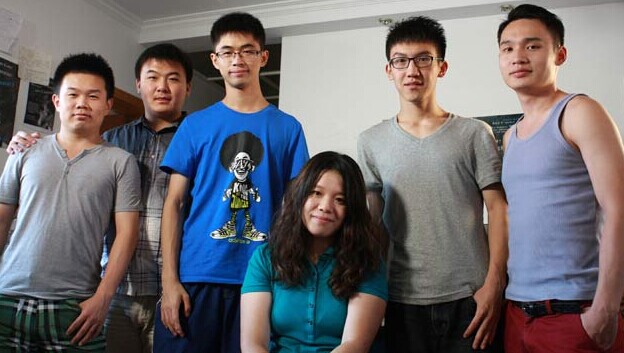

Liu Xianran (third left), Tsinghua University graduate and 22-year-old business owner, takes a group photo with his team. Liu is one of China's younger generation looking to make fortunes from the booming Internet industry. WANG ZHUANGFEI / CHINA DAILY
Young Chinese entrepreneurs are tapping opportunities from the Internet to realize their world-changing dreams
When China was first connected to the Internet in 1994, Liu Xianran was 2.
At the age of 8, Liu had his first computer and was fascinated with cyberspace as he played computer games.
Now the 22-year-old wants to earn his first pot of gold in China's booming Internet business and, maybe, change the world.
When Liu, who majored in chemical engineering, graduated recently from the elite Tsinghua University, he gave up offers of well-paid jobs from consulting firms and developed an education smartphone application with his schoolmates in a rented apartment in Beijing.
"If I took the offers, I would be earning more than a million yuan annually in five years. But my dream is bigger than being a millionaire," Liu said.
"I want to make our world a better place by doing what I am interested in and make a fortune."
The Internet has given Chinese in their 20s like Liu great opportunities to start their own business and strike it rich, said Zhang Yichi, professor at Guanghua School of Management of Peking University and director of the school's Center for Innovation and Entrepreneurship.
Thanks to the Internet, there are fewer upfront costs for young business owners, Zhang said.
Unlike traditional industries, Internet companies can build websites, host conference calls and launch online marketing campaigns, all on a shoestring budget.
Open-source software can also reduce or eliminate the need for consultants and tech support.
"For people who are under 25, it is the golden age to start their own business," Zhang said.
"They have the opportunity and character that other generations don't have."
It cost Liu less than 100,000 yuan to found his first company. Most of the money was spent on renting the two-bedroom apartment where Liu and his team live and work.
The sole female team member takes up one bedroom while Liu and three other men take the other one. Two of the men use a bunk bed and the 22-year-old CEO shares a double bed with another member.
Laptops and power cables take over the 10-square-meter living room, which they call an office. Posters of their smartphone app, colorful notes of ideas and take-out menus are pasted all over the walls.
The team's English-learning app enables users to upload their English speaking samples through their smartphones and receive feedback from native English-speaking teachers to improve their spoken English.
Two weeks after the app was put online, the system nearly crashed because too many users got on board.
Liu said learning the language from native English speakers used to be time-consuming and expensive. People who live in rural areas never get a chance to see a foreigner, not to mention learn from them.
"The Internet is breaking down the barriers," Liu said. "I am not tech savvy. I had my first iPhone in 2012. But I have to know the Internet, everyone has to know it. It is the future."
China now boasts 3.2 million websites. The number of Chinese netizens has grown to 618 million, and 500 million of them are surfing online with their smartphones, according to a report in December 2013 by the China Internet Network Information Center.
Born in 1993, Wang Yue said he grew up hearing about the success stories of Internet tycoons. This year, the sophomore at Peking University launched a long-distance education website and quickly attracted more than a million yuan in investment.
In high school, Wang made money by giving lectures to junior schoolmates on taking tests. In the first year in Peking University, he bought watermelons from the market at 1.2 yuan a kilogram and sold them on campus for 2 yuan a kg
"But all those businesses were small and, most important, not cool," Wang said.
For the 21-year-old, Google, Tesla Motors, and Steve Jobs, the legendary co-founder and CEO of Apple, are "cool".
Govt provides financial help, consulting services to startups
2014-08-27Innovation, unique business models help Chinese IT startups thrive
2014-08-04Wuhan supports young owners of startups
2014-07-16Business startups setting a hot pace
2014-04-28Copyright ©1999-2018
Chinanews.com. All rights reserved.
Reproduction in whole or in part without permission is prohibited.